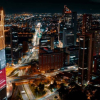In a heartfelt event, the Mayor's Office of Bogotá commemorated LGBTIQ+ Pride Month through a symbolic act: the hoisting of 20 flags representing the LGBTIQ+ community at the iconic Monument of Flags located in the Kennedy district.
Ten flags represent the LGBTI community, while the other ten represent the Trans community, transforming this iconic site into a space of unity and solidarity among nations, where diversity is celebrated and equality and respect for the LGBTI community are promoted.
"Today is a very special day within our Pride Month. Worldwide, our LGBTIQ+ community celebrates Pride Month to remind societies across the globe that we exist, that we deserve respect, that we deserve freedom, and that we are willing to fulfill the same responsibilities as any other citizen, but all we ask for is equal rights," expressed Mayor Claudia López during the event.
Contenidos relacionados
The city's leader added in her speech, "By working together, embracing our diversity and the plurality of opinions we hold, we have made great progress, especially in Bogotá, and we know that what progresses in our city progresses in Colombia. That is why we proudly celebrate the fight for rights throughout the country."
In a tweet, Mayor Claudia López referred to the raising of LGBTIQ+ flags:
En el #MesDelOrgullo hoy izamos en el monumento banderas en Kennedy las banderas de nuestra comunidad 🏳️🌈 🏳️⚧️ honrando la memoria de quienes han dado las luchas por la igualdad y celebrando los avances de @SePuedeSer en Bogotá.
— Claudia López Hernández (@ClaudiaLopez) June 28, 2023
Les esperamos este domingo en la marcha distrital! pic.twitter.com/p0eNwsCBB6
From the Monument of Flags, the mayor affirmed, "here, we honor many causes, and that's why we raise the flags, for the causes we represent."
The ceremony was attended by representatives from the United States Embassy, who joined in a gesture of support for the event, solidarity, and recognition of the universal rights of all individuals, regardless of their sexual orientation or gender identity.
Francisco Luis Palmieri, the U.S. Ambassador to Colombia, stated, "Mayor Claudia López has been a key ally of the American embassy in Bogotá on various issues, including diversity. Her efforts continue to make Bogotá a city where every person can be who they want to be and live with respect and dignity."
The Monument of Flags, located in the Kennedy district, stands as a beacon of hope and a constant reminder of the need to build a more inclusive and respectful world where everyone can live in freedom and fulfillment, especially those who have faced exclusion and violence due to their sexual orientation or gender identity.
The Monument of Flags was built in 1948 to commemorate the IX Pan-American Conference, which gave rise to the Organization of American States (OAS). It consists of 120 statues of women arranged in 20 columns. It has become a symbol of the city and a significant landmark for both Bogotá residents and visitors.
Thanks to the actions carried out within the framework of Bogotá's LGBTI+ Public Policy, which has been in place for 15 years, the city has become a national and international reference in providing support to individuals from the LGBTI social sectors. In 2021, Bogotá updated the Action Plan of the Policy to ensure its implementation until 2032, projecting an investment of 280 billion pesos from all city entities.
At the end of López's administration, Bogotá will have invested more resources in the LGBTI social sectors than the three previous administrations combined: $54.725 billion invested over these three years, compared to $38 billion invested between 2008 and 2020.
Margarita Barraquer, Secretary of Social Integration, stated, "Today, in this monument, we are not only recognizing the LGBTI sectors but also committing ourselves to the city, ensuring that the motto of public policy becomes a reality because, in Bogota, you can be who you are. I invite everyone to join us today in signing this commitment, which is a significant milestone in our LGBTI policy."
Never before has an administration done so much for this population, and as part of this policy, Bogotá has tripled its institutional offering of inclusion and diversity. For example, the LGBTI+ population has been strengthened in terms of investment, workforce, and operational systems with the opening of five LGBTI Houses in different areas of the city. At the beginning of this government, there were only two.
Furthermore, during this administration, Bogotá has achieved the following:
- Over 23,000 individuals from the LGBTI sectors, families, and support networks have received attention through the social services provided by the LGBTI Public Policy of Bogotá.
- More than 8,085 people have been served through the services offered at community centers.
- 1,777 monetary transfers have been made to LGBTI individuals in situations of social vulnerability.
- Over 5,400 individuals from the LGBTI social sectors are participating in capacity-building processes for employment.
- Additionally, the District has invested $107,501,000 in strengthening its entrepreneurial endeavors.
- More than 6,160 people from the LGBTI sectors are participating in public affairs of the city, and over 5,900 attentions have been provided in building networks of support and affection.
- There have been over 3,600 attentions in health services and risk management, with 721 individuals receiving assistance for food insecurity.
At the end of this administration, the city will have 5 LGTBI houses delivered and in service. There will be three more: Amapola Jones (South Zone, in service), Laura Weinstein (North Zone, in service), and Edward Hernández, located in Kennedy, which is scheduled to open in August 2023.
In the LGTB houses, the city offers psychosocial support, socio-legal assistance, computer rooms, and training programs, among other services. This administration renewed the image and name of these spaces to make them more approachable: they are called "Casas" (Houses). The concept of 'House' refers to a safe place, a meeting place for people in their diversity, and they are named after individuals who fought for the recognition of people with diverse sexual orientations and gender identities in Bogotá.
What happened on June 28, 1969?
Pride Month is celebrated in June to commemorate the Stonewall uprising that took place in New York City in 1969. In the early morning of June 28, 1969, the police raided the Stonewall Inn, a gay bar located in Greenwich Village, New York. The gay community of New York erupted in riots for three days, tired of years of harassment by the authorities. And why is it called Pride Month? The term is attributed to Brenda Howard, a bisexual activist from New York, who organized the first Pride parade on the first anniversary of the Stonewall uprising the following year, in 1970.
In this video, you can relive the event where 20 LGBTIQ+ flags were raised:




